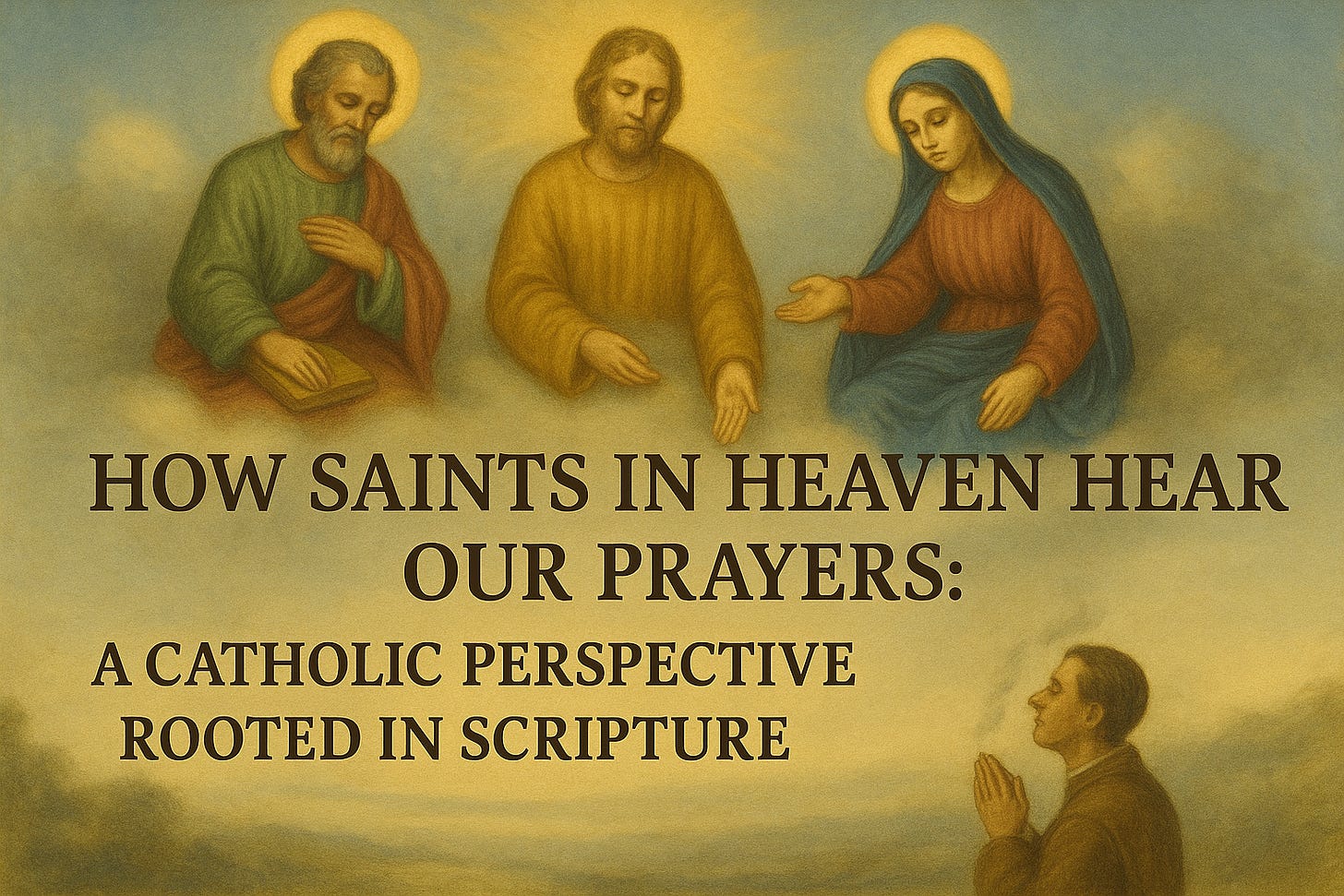From a Catholic perspective, the belief that saints in Heaven hear and intercede for our prayers on Earth is a cherished doctrine, deeply rooted in Scripture and theology. By reasoning from first principles—core truths about God, Heaven, and the communion of saints—we can understand how this process unfolds, illuminated by biblical texts that affirm the saints’ role in God’s plan of salvation.
Foundational Principles
Catholic theology begins with essential truths:
God is omnipotent, omniscient, and the source of all being. He sustains creation and knows every thought and prayer (Psalm 139:1–4: “O Lord, you have searched me and known me… you discern my thoughts from afar”; Colossians 1:16–17).
Heaven is perfect union with God. The saints, glorified in the Beatific Vision, see God face-to-face (1 Corinthians 13:12: “Then face to face”; 1 John 3:2: “We shall be like him, for we shall see him as he is”).
The communion of saints unites all members of Christ’s Body. This includes the Church Militant (on Earth), Suffering (in Purgatory), and Triumphant (in Heaven), bound together in Christ (Hebrews 12:1: “A great cloud of witnesses”; Catechism of the Catholic Church [CCC] 954–959).
Grace enables participation in God’s life. The saints, perfected in grace, share in God’s attributes in a created manner (2 Peter 1:4: “Partakers of the divine nature”; CCC 1996–2000).
Prayer is directed to God. Prayers to saints seek their intercession, not worship, as they present petitions to God (Revelation 5:8; CCC 956, 2683).
The Saints’ Awareness of Earthly Prayers
How do saints, as finite creatures, hear countless prayers? The answer lies in their union with God.
Participation in God’s Knowledge
In Heaven, the saints behold God’s essence in the Beatific Vision, sharing in His knowledge as suited to their glorified state (1 Corinthians 13:12; 1 John 3:2). God, who knows all prayers (Psalm 139:1–4), communicates these petitions to the saints. This is not an independent ability but a grace-enabled participation in God’s omniscience (2 Peter 1:4). Just as grace elevates human understanding on Earth, in Heaven, it perfects the saints’ capacity to know what God wills, including prayers addressed to them.
The Spiritual Act of “Hearing”
The term “hearing” is metaphorical, as saints lack physical senses. Their awareness is a spiritual act, facilitated by God’s power. Scripture supports this vividly. In Revelation 5:8, the “twenty-four elders” in Heaven offer “golden bowls full of incense, which are the prayers of the saints,” showing their engagement with earthly petitions. Similarly, Revelation 8:3–4 depicts an angel presenting “the prayers of all the saints” with incense at God’s altar, suggesting that heavenly beings are aware of prayers through God’s mediation. While angels differ from human saints, these passages illustrate a broader principle: God enables those in Heaven to know earthly needs.
The saints’ ability to process countless prayers transcends human limits. In their glorified state, they operate in God’s eternal perspective (Psalm 90:4: “A thousand years in your sight are but as yesterday”), with God’s infinite power sustaining their awareness.
The Communion of Saints in Action
The communion of saints reflects the unity of Christ’s Mystical Body, where all members support one another. Hebrews 12:1 portrays the saints as a “cloud of witnesses,” actively concerned for those on Earth. Their intercession mirrors earthly Christians praying for each other (James 5:16: “Pray for one another”), but with greater efficacy due to their perfect union with God.
Scripture offers glimpses of this intercessory role. In 2 Maccabees 15:12–14 (canonical in Catholic tradition), the deceased prophet Jeremiah prays for Israel, indicating that the righteous dead intercede for the living. In Luke 16:19–31, the rich man petitions Abraham from Hades, suggesting the awareness of the righteous in the afterlife. These examples foreshadow the saints’ role in Heaven, where their love, perfected in God’s presence, drives them to intercede for us.
Safeguarding God’s Primacy
The saints’ intercession depends entirely on God, who “works all things” (Ephesians 1:11). They do not act independently but rely on God’s power to hear and respond (John 15:5: “Apart from me you can do nothing”). Their role complements, not competes with, Christ’s unique mediation (1 Timothy 2:5), as all intercession participates in His priesthood (1 Timothy 2:1–2).
The diversity of saints—Mary, Joseph, Therese—reflects God’s manifold gifts (1 Corinthians 12:4–6). Each intercedes according to their unique charism, magnifying God’s glory through their cooperation in His plan.
Conclusion: A Mystery of Grace
The saints in Heaven hear our prayers because God, in His omniscience (Psalm 139:1–4), shares these petitions with them through the Beatific Vision (1 Corinthians 13:12; 1 John 3:2). Enabled by grace (2 Peter 1:4), they present our prayers to God (Revelation 5:8, 8:3–4), interceding as part of the communion of saints (Hebrews 12:1; 2 Maccabees 15:12–14). This process, wholly dependent on God’s power, glorifies Him while uniting the Church across Heaven and Earth.
Though the exact mechanism remains a mystery, Scripture and Catholic theology affirm that the saints’ intercession is a beautiful expression of God’s love, inviting us to seek their prayers as we journey toward Him (CCC 956, 2683).



